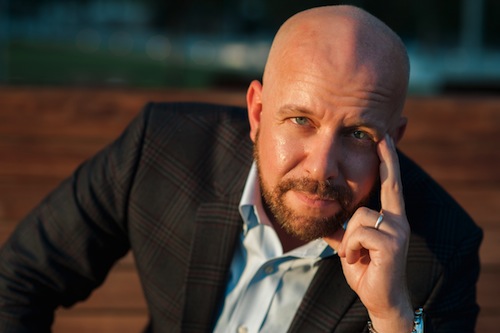Seraphic Fire wraps season with an entertaining Shakespeare program

James K. Bass conducted Seraphic Fire’s program of Shakespeare settings Wednesday night at St. Sophia Greek Orthodox Cathedral in Miami.
Seraphic Fire has had an unusually rewarding season. Monteverdi’s liturgical scores, Brahms’ Liebeslieder Waltzes and the “Parables of Passion” series (highlighting sacred and secular passion settings by Bach, David Lang and Arvo Pärt) have comprised a rich bill of fare.
On Wednesday night the chamber choir presented a program of music inspired by the writings of William Shakespeare at St. Sophia Greek Orthodox Cathedral in Miami. The concert provided a musical dessert to the year’s main courses although it was hardly lacking in substance.
Associate conductor James K. Bass was the evening’s genial host and director and actress Siobhan Doherty recited excerpts from the Bard’s plays between some of the musical offerings. Extant musical selections from Shakespeare’s plays by that most famous of composers Anonymous, music from the playwright’s time that he may have heard in pubs and informal gatherings and settings of his texts by contemporary composers mingled to charming effect in the well-chosen program.
The overlapping harmonic lines and constantly surprising changes of melodic span in Mike Sheppard’s Music to Hear provided a diverting concert opener. Four of Matthew Harris’s Shakespeare Songs ranged from the solemn “I Shall No More to Sea” to the rhythmic “It Was a Lover and His Lass,” sung with the stylish lightness of an English round.
Vaughan Williams’ Three Shakespeare Songs spanned the varied stylistic impulses of one England’s greatest 20th-century composers. The female voices repeated “ding dong” over the male singers’ principal melodic line conjured up the eerie milieu of “Full Fathom Five”; following a full-throated climax, Bass masterfully drew out the soft fadeout of this death-tinged miniature. The choir’s varied dynamic range was strongly displayed in “The Cloud-Capp’d Towers.” Vaughan Williams was an inveterate collector of British folk music and “Over Hill, Over Dale” was infused with that vernacular spirit.
Nils Lindberg’s “Shall I compare thee to a summer’s day?” sounded almost like a pop ballad while Steven Sametz’s dark setting of “When He Shall Die” suggested less solace than fear and despair.
One of Seraphic Fire’s educational initiatives involves working with composition students at the University of Miami’s Frost School of Music. Benjamin Montgomery is pursuing doctoral studies under Dorothy Hindman at the Frost school.
Montgomery’s “To Hear With Eyes” is being premiered by Bass and the choir in this concerts, and, based on this vignette, he is clearly a gifted composer. The work’s harmonies and thematic shifts vividly convey the emotional contours of the text. Montgomery could not have wished for a more superbly sung performance. The depth of the male singers’ low ranges was tested by Montgomery’s writing but the singers encompassed all his demands.
The refreshing cross-cultural sensibility of two of Finnish composer Jaako Mäntyjärvi’s Four Shakespeare Songs offered a spirited aural tapestry to conclude the evening. The lilting “la-la-la” of “Lullaby” was enchanting. Macbeth’s witches’ pitched screaming offset the catchy tune for “Double, Double Toil and Trouble,” assayed in a delightful tongue-in-cheek manner.
Songs from Shakespeare’s time by William Byrd and Thomas Morley allowed the choir to shine. Morley’s “April is in My Mistress’ Face” spotlighted Seraphic Fire’s signature luminous sonority. Morley’s “Sing We and Chant It” was almost a drinking song, sung with robust articulation and supple blending. A silvery-toned rendition of Byrd’s “Come Woeful Orpheus” and a spacious version of Morley’s liturgical “Nolo Mortem Peccatoris” were led with dramatic weight by Bass.
Songs from the plays (composers unknown) brought the evening’s solo opportunities. Brenna Wells’s high, pure soprano took on the informal directness of a folk singer for “Robin is to the Greenwood Gone” from Hamlet. Emily Marvosh’s fine mezzo and crisp diction perfectly conveyed the fantasy of “Take, O Take Those Lips Away” from Measure for Measure. “Come Away, Come Away Death” from Twelfth Night was finely spun by John Buffet’s mellow bass. Soprano Chelsea Helm’s mock-operatic drama hit just the right comedic note for “File On Sinful Fantasy” from The Merry Wives of Windsor. Two robust male trios seemed perfect for a pint of ale.
Doherty’s readings captured the diverse worlds of fantasy, tragedy and mirth that encompass the Bard of Avon, in a straightforward delivery that avoided histrionics. Doherty’s winning version of Hamlet’s “To be or not to be” soliloquy was particularly effective. Here was a reminder that, just as Shakespeare’s all-male acting company played female roles, such distinguished actresses as Judith Anderson and Diane Venora have portrayed the Danish prince.
There are three remaining performances of this entertaining Shakespearian potpourri.
Seraphic Fire repeats the program 7:30 p.m. Friday at St. Philip’s Episcopal Church in Coral Gables, 7:30 p.m. Saturday at All Saints Episcopal Church in Fort Lauderdale and 4 p.m. Sunday at All Souls Episcopal Church in Miami Beach. seraphicfire.org
Posted in Performances
Leave a Comment
Thu May 10, 2018
at 1:10 pm
No Comments




